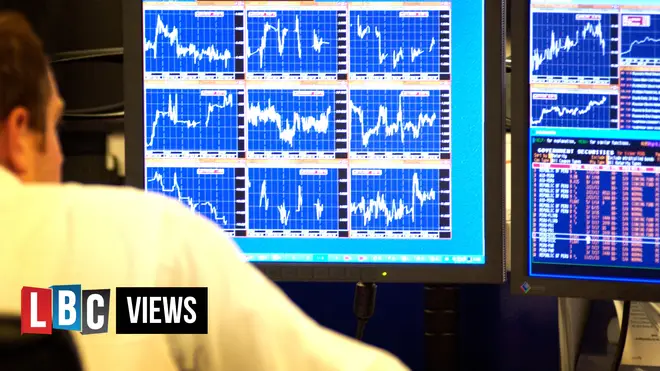
Paul Brand 10am - 12pm
15 January 2024, 08:37

It is generally felt that global stock markets’ performances are very often not an accurate barometer of economic activity. In fact, their behaviour is often erratic and occasionally illogical.
One only needs to look at the performance of the S&P 500 (+24%) and the NASDAQ Composite (+43%) last year, against a background of geopolitical unrest, rampant inflation, soaring global debt, stagnant growth, and diminishing profits to realise that investors took a calculated gamble on the back of the mushrooming excitement of ‘AI’ for the major advancement of the tech sector and especially the ‘magnificent seven’ (Apple, Amazon, Microsoft, Nvidia etc) to achieve the extraordinary gains made, especially in the US.
Investors paid a huge premium for future earnings and crossed their fingers in the process. Set out below is data reflecting the performance of the main international indices since the start of the year.
FTSE 100 -1.40%, DAX -0.74%, CAC40 -1.48%, DJIA +0.07%, S&P500 +0.81%, NASDAQ +0.67%, NIKKEI 225 +7.18%, HANG SENG -5.20%, SHANGHAI -3.05%, FTSE 250 -2.50%
Not only do investors have to digest the influence of day-to-day economic data, corporate news and earnings, but they also must add the vagaries of algorithm and programme trading and the power and influence generated by ‘AI!’
That alone represents challenging conditions. The current geopolitical imponderables, which continue to rear their ugly heads, further add to the complexity of investment decisions.
For a start, there are no less than 70 global General Elections this year. Putin’s election, we can take as a ‘slam-dunk.’ There is every chance that Trump will beat Biden in the November Presidential Election.
Were Trump to win, that could throw foreign policy into total disarray? Ukraine, Israel, the Red Sea/Yemen, and other parts of the Middle East would look very vulnerable.
When Trump says America first, second and third, the world will have to start to believe it!
As for our General Election, it appears that the public may well have had enough of the Conservatives after thirteen years. However, a Labour majority of 150+ would be unhealthy.
The rise of ‘Reform’ and its growing support suggest votes would come largely from Tories and especially the ‘Red Wall.’ The Prime Minister, in my humble opinion, together with Chancellor Hunt, did a very competent job ‘putting Humpty together again’, after the ‘Truss debacle.’
However, their puritanical approach to stimulating the economy has left many of their supporters cold with insufficient support for business including tax relief. The overall tax burden can only be described as tyrannical.
It is generally thought that a Starmer administration will not have sufficient headroom to make many radical changes or implement draconian legislation if it intends to observe fiscal discipline.
However, a huge majority would see the hard left flexing their muscles, making life uncomfortable for Messrs Starmer and Reeves. The £28 billion investment in net zero/green energy policy will need some further cost explanation.
Also, Labour’s immigration policies seem overly vague, with conditions in that arena unlikely to improve. Bold action will be a prerequisite.
At the end of 2023 stock market investors selected another gear in the hope that inflation, having been brought down in the UK from 11.1% to 3.9% and in the US from 9.1% to 3.4% in 2023, would trigger between three and six interest rate cuts by the Central banks this coming year, with the Federal Reserve dictating the pace.
The bombing of the Houthi in Yemen may only find a temporary solution. If the situation in the Gulf escalates, then inflation will prove to remain stubborn, with the cost of shipping and the inevitable increase in the cost of oil and gas. They are all inflationary components.
A 13,000-mile detour around the Cape of Good Hope puts an extra cost of £1 million per ship. It is as well to remember that 15% of goods travelling by container go through the Red Sea and Suez Canal.
Many of you are ‘long enough in the tooth’ to know that history has told us that inflation takes much longer to come down than it does to go up. Many economists are of the opinion that inflation in the UK could be down to near 2% by the autumn, thanks in the main to substantial drops in the price of gas and oil being maintained. I hope they are right, but I would not stake my life on that eventuality, especially if the crises in Ukraine, Gaza and the Red Sea remain virulent. Also, food prices may continue to remain stubbornly high.
There is also another ‘elephant in the room.’ – Global Debt at $307 trillion, with the US nursing a gargantuan $33 trillion of debt with the UK at £2.7 trillion. This is cause for concern if investors feel these increasing levels of debt are unsustainable. ‘A run’ on government bonds would be very unwelcome.

There is no doubt that the world has not recovered from either the 2008/9 financial crisis or even more stridently the aftereffects of Covid, which continues to savage humanity. An increase in mental health issues has inflicted brutal damage on society. I think it has impaired our approach to work ethic as well as the creation of wealth. Working from home is a nonsense. It is here to stay, but more than 2-days-a-week is counter-productive. How can the workforce learn interpersonal skills, plus the ability to build relationships and negotiate contracts? The case for working from home becomes flimsier, as time goes by. It also leads to dropping school attendances, which is probably more damaging than all the other negative aspects.
In closing the Government needs to be much more pro-active over BREXIT. The benefits to date have not been that obvious. The UK is out of the EU, much to big business’s chagrin and dismay. So, the government and business need to capitalise on the benefits of sovereignty. The Government has been far too risk averse, which has also been a malaise with industry and commerce itself. Hence investment opportunities have been missed. Softening regulation should have been an ‘open goal’ to attract business to the ‘City.’ Efforts to steal a march on financial services has been painfully slow.

As UK assets continue to look very cheap, private equity continues to dominate the M&A agenda. There are a host of tech companies, bulging with innovation, which should be attracting investment here in the UK. The LSE’S AIM and Aquis Exchange should be run off their feet, bringing exciting companies to the market.
The civil service, in many areas such as the Home Office, conveys the impression that it is only prepared to execute the government’s business at its behest. It has far too much of an opinion on what it thinks are the correct policies rather what it is told to do. Perhaps its ability to work from home, should be cut back substantially. Then some order and sense of urgency could be restored.
Fund managers and investors will certainly be ‘earning their corn’ this year, as they plough their way through a labyrinth of political and economic uncertainty and imponderables.
LBC Views provides a platform for diverse opinions on current affairs and matters of public interest. The views expressed are those of the authors and do not necessarily reflect the official LBC position.
To contact us email views@lbc.co.uk